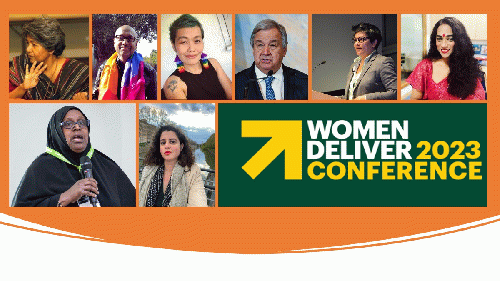Midway to Agenda 2030: Why are we off the track on gender equality?
SUMITA THAPAR - CNS

Feminist fossil-fuel free future is the only sustainable future for humans and our planet
(Image by CNS) Details DMCA
With only 90 months left to fulfil the Agenda 2030 promises made by our governments 90 months ago, we are far off the track. A United Nations report released this week shows that out of the 114 countries studied, not one has achieved gender equality. Over 99% women and girls live in a country with low women's empowerment and a big gender gap. The Sustainable Development Goals Report 2022 also had painted a grim picture, including on the progress made on delivering the goals for gender equality, which is crucial to achieving each of the 17 UN Sustainable Development Goals (SDGs).
Real democracy and gender equality go together
The Women Deliver Conference 2023 (#WD2023) taking place in Kigali, Rwanda (17-20 July 2023), comes at a very opportune time to take stock, address compounding issues impacting girls and women (such as, climate change, sexual and other forms of gender-based violence, unpaid care work, among others), and to collectively identify and action evidence-based solutions.
According to Dr Maliha Khan who heads Women Deliver, only in democracies do women and girls, including gender-fluid persons, have a chance to have their rights. But democratic spaces are closing in many countries of the world.
For Azra Talat Sayeed, a women's rights activist from Pakistan, who also heads the International Women's Alliance, and Roots for Equity, "gender equality is part of the larger development justice agenda. Progress on gender justice is interdependent on progress on social justice, economic justice, health justice, climate justice, redistributive justice, and accountability to peoples." Azra works with the most vulnerable and marginalized communities, including small and landless farmers, women and religious minorities. She was one of the speakers of #90for90 Global Voices who are featured as part of the ongoing Gender Equality Talks (Season-2) series by CNS.
Dismantle patriarchy
Speaking with CNS, Azra said that, "Our society is intensely patriarchal, and feudalism, capitalism, militarisation, and religious intolerance push it further. Slave era could not have happened without slave labour. Likewise, in today's capitalist and feudal era, labour is impossible without women's contribution. For example, over 75% of hard work in farm labour is done by women, which is in addition to the unpaid care work girls and women do. If women were to be given freedom, this highly subsidized system of production through (cheap or free) women's labour will be exposed and trampled upon immediately.
"So to sustain capitalist and feudal economies, they will maintain control over women's bodies and women's minds. One way they do so is by economic injustices - by paying girls and women nothing or paying them very little. More importantly, women's agency in managing her own finances is seldom recognised. Another way to control women and girls is psychological terror - by fuelling and normalising harmful narratives like to be a liberated woman means to be a loose woman," she added.
Azra rightly believes that capitalist economies thrive on exploitation of women's labour. She shared that some of the women farmers she works with only get a portion of the harvest as wages for their labour. Earlier they used to cut wheat and got paid in wheat - which at least provided them with some food. But now the focus is on growing sugarcane. So all they get now is fodder in return for their hard work.
"Women have to be organized to dismantle patriarchy. We need to educate and organize our women to understand what is the source of their hunger, of them not being educated, of them suffering from climate injustices, and other forms of exploitation and harassment," asserts Azra. Real hope for a socially just and ecologically sustainable world lies in strengthening people's movements.
Degan Ali of African Development Solutions echoed similar thoughts while speaking at a plenary of #WD2023. She shared that globally 80% of the coffee-producing farmers are women. But despite working very hard, they live on less than USD 2 a day, while big multinational companies of the Global North benefit from their labour. It is the global trade architecture that must change in the first place, she added.
Gozde Ones, who works with the Regional Advocacy for Women's Sustainable Advancement (RAWSA) Alliance in the African and Arab region, told CNS that education is key to achieving gender equality, and governments have a crucial role in ensuring access to education for women and girls, especially in rural and conflict affected areas. "We need education on women's rights for both men and women. Most of the governance is led by men, they can easily decide when to start a war, or when to abolish women's rights (like in Afghanistan). Men need to be educated about gender equality."
Unpack gender
CNS also spoke with some grassroots activists from LGBTQIAP+ communities to focus on some of their problems that have been pushed under the carpet for long.
Gay rights activist Darvesh Yadavendra Singh, who runs the Pahal Foundation in India, says that economic empowerment is crucial and a lot more needs to be done to ensure inclusion in societies. "In India, the government has a skill-development programme, but where is queer representation in this? Are people being sensitised? Queer people need financial resources and access to entrepreneurial opportunities."
Then again, "while India's New Education Policy mentions the girl child and the transgender child, this does not translate into action on the ground. Making schools safe spaces for queer children is important and for that schools must understand issues of gender diversity," he said. The progress is uneven and insufficient, and policies need to translate into action.
(Note: You can view every article as one long page if you sign up as an Advocate Member, or higher).





